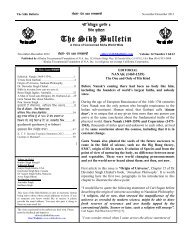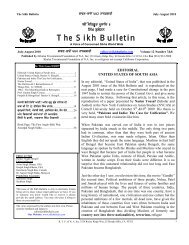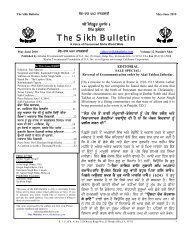Selected Editorials - The Sikh Bulletin
Selected Editorials - The Sikh Bulletin
Selected Editorials - The Sikh Bulletin
You also want an ePaper? Increase the reach of your titles
YUMPU automatically turns print PDFs into web optimized ePapers that Google loves.
Nanak. Guru is giving a sermon. Who is he giving the sermon to In his audience are Hindus and<br />
Muslims, adherents of the two dominant faiths of that time. Did he treat them differently from each other<br />
or did he treat them as humans eager to make sense out of this life Did he see Hindu and Muslim faces or<br />
Human faces<br />
kbIr pRIiq iek isau kIey Awn duibDw jwie]<br />
BwvY lWby kys kru BwvY Grir mufwie] p 1365<br />
Earlier I have made reference to the ‘Save Turban Panel’ created by the DSGMC to handle what it<br />
called ‘the current cultural crisis facing the religion’. This panel will not be able to solve the problem<br />
because for all of them uncut hair and turban is an integral part of <strong>Sikh</strong>i. But, inadvertently, they have<br />
used the correct term, ‘cultural crisis’. Long hair, not necessarily uncut, has been part of the ancient<br />
cultures. During Guru period people of all faiths kept long hair. Even today some people in some faiths<br />
keep long beards and others long hair. Hair and dress are cultural phenomenon. For those of us who are<br />
calling Diaspora our home, to expect our children to keep long hair and turban/chunni is and will remain a<br />
disheartening experience.<br />
We often read about the glowing tributes that foreign scholars have paid to AGGS. One such tribute by<br />
Max Arthur Macauliffe is on page 3. Mr. Macauliffe gave up a very promising career in British India<br />
Civil Service to devote his life to the study of Guru Granth Sahib but he did not convert to <strong>Sikh</strong>ism; nor<br />
did scores of others who lauded the <strong>Sikh</strong> scriptures in similar language. Have we been instrumental in<br />
denying the Gurbani experience to the rest of the world<br />
Is it not time, to use the language of Col. Avtar Singh in his letter to the editor on page 23 ‘that <strong>Sikh</strong>s<br />
residing outside India need to delink themselves from the petty politics of Punjab’, but modify it to read<br />
‘that <strong>Sikh</strong>s residing outside India need to delink <strong>Sikh</strong>i from restrictions of Bana’ This must in no<br />
way be construed as opposition to Bana. We should first expose the individual to Gurbani and let the<br />
desire for Bana come from within.<br />
*****<br />
EDITORIAL<br />
SIKH, SINGH AND KHALSA<br />
[Editorial from March 2005 <strong>Sikh</strong> <strong>Bulletin</strong>]<br />
Hardev Singh Shergill<br />
Two incidents from my teenage years growing up in Ganganagar District of Rajasthan stand out. One<br />
was the death of a great grandmother whose death at over 105 years of age was celebrated as a joyous<br />
occasion by four generations of her family that hailed from District of Jalandhar in Panjab. Whereas this<br />
death was celebrated joyfully, the other incident brought the same family into mourning. In 1951 one of<br />
the fourth generation cut his hair and shaved whatever beard he had. He was only seventeen. I can still<br />
sense the grief of the entire family. Today the situation both in Ganganagar District and Districts of<br />
Panjab is completely topsy-turvy.<br />
<strong>The</strong> editorial ‘Bani and Bana’ in last month’s issue has evoked considerable response, both in favour and<br />
against. <strong>Sikh</strong>s are no longer confined to Panjab or other parts of India. During earlier migrations to<br />
foreign lands during British Colonial era <strong>Sikh</strong>s were able to transplant themselves in foreign lands but<br />
still maintain their personal appearance and cultural traditions of Panjab. But the whole world has<br />
undergone rapid transformation. Racial, religious, geographical, linguistic and cultural barriers are<br />
breaking down. We can no longer afford the luxury of deferring important decisions as we have done in<br />
the case of ‘Dasam Granth’ and ‘Ragmala’. Nor are we going to allow ourselves to be answerable to self<br />
styled clergy and other religious leaders back in Panjab for reasons eloquently detailed by S. Suaran<br />
Singh’s article ‘Urgent Need for Reformation in <strong>Sikh</strong>i’ 1 . <strong>Sikh</strong>s in Diaspora are not surrounded by a sea of<br />
‘Hinduism’ that has adversely influenced our growth and development during the last three hundred<br />
22
















